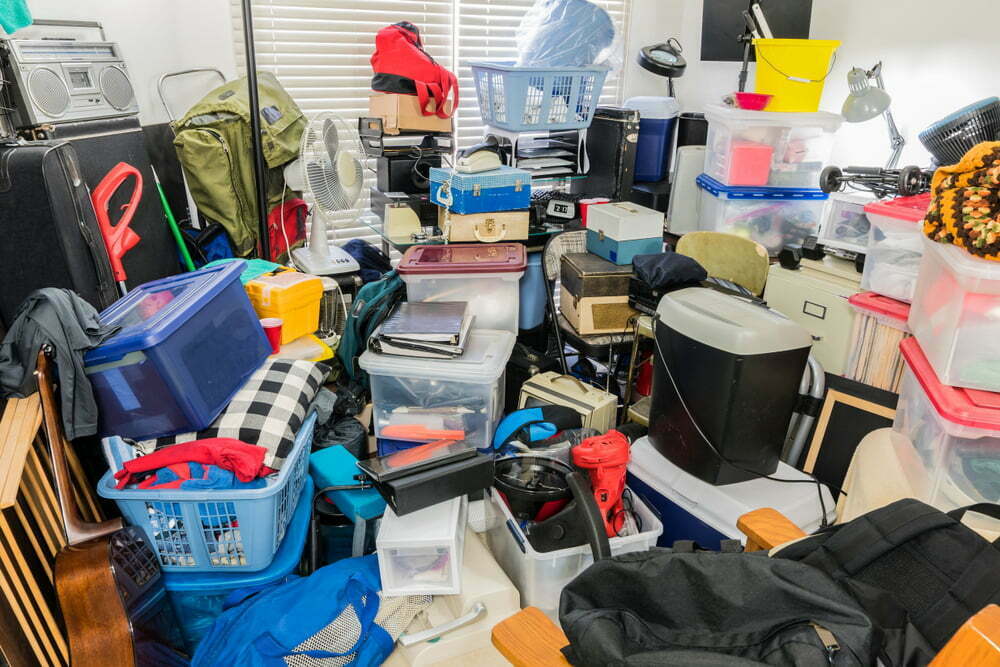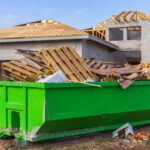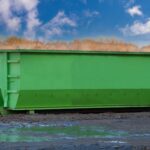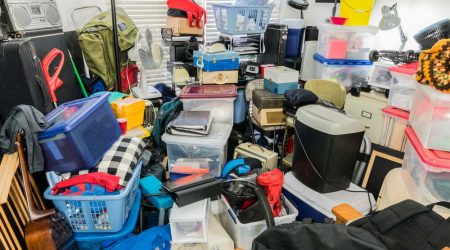Estate cleanouts have always been big customers for roll-off dumpster rentals. Usually, the relatives are out of town, up against a deadline, and need to get rid of stuff fast, which is where the dumpster rentals come in handy. However, some of these cleanouts become incredibly challenging because the relatives discover that their deceased loved one was a hoarder.
At present, researchers believe that compulsive hoarding affects 1 out of every 50 people. Circle J Roll-Offs President John Jordan’s experience suggests that hoarding is more common than that. “About 30% of our estate roll-off dumpster rentals are for homes of hoarders,” says Jordan.

What is Hoarding?
According to the Mayo Clinic, a hoarding disorder is defined as:
Hoarding disorder is a persistent difficulty discarding or parting with possessions because of a perceived need to save them. A person with hoarding disorder experiences distress at the thought of getting rid of the items. Excessive accumulation of items, regardless of actual value, occurs.
Hoarding often creates such cramped living conditions that homes may be filled to capacity, with only narrow pathways winding through stacks of clutter. Countertops, sinks, stoves, desks, stairways and virtually all other surfaces are usually piled with stuff. And when there’s no more room inside, the clutter may spread to the garage, vehicles, yard and other storage facilities.
Hoarding disorders impact the relatives of the deceased loved one and have adverse effects on almost every aspect of a living hoarder. So intervening with professional help for someone with a hoarding disorder is essential.
Because most hoarding encountered in estate cleanouts is the hoarding of possessions, some of the common possessions that are hoarded include:
- Clothes
- Newspapers and magazines
- Books
- Toys and collectibles
- Tools and supplies
- Food
Most hoarders collect many different things and can’t resist buying more, even if they are drowning in stuff.
Why Do People Hoard?
There are many reasons that a hoarding disorder may develop. Some have irrational sentimental attachments to objects that may seem like junk to any other person, yet it is difficult for the hoarder to part with it. Others fear running out of specific items or supplies, so they “stockpile” them for a rainy day. Still, other sufferers of hoarding disorders collect free items, and others become compulsive shoppers. These individuals are always on the lookout for good deals even if acquiring them creates financial hardship such as massive credit card debt or clutters an already dangerously cluttered home.
Studies have shown that there is a genetic component to hoarding behavior. An older adult with a hoarding disorder often has a family history of these behaviors. Other hoarding behaviors might be triggered by a stressful event such as a death of a close loved one, a divorce, or a life-changing accident. Sometimes, hoarding comes along with other mental health conditions such as anxiety, depression, or obsessive-compulsive disorder (OCD).
What Are the Dangers of Hoarding?
Hoarding has a lot of adverse psychological effects, such as causing stress and anxiety and overwhelming and draining the energy levels of those suffering from it. Thus, hoarding is not only a mental health concern, but it can also endanger those suffering from it physically and those around them. Some of these dangers include:
- Tripping – Having stuff everywhere makes it easy to trip and fall, causing sprains, broken bones, concussions, and even death.
- Fire Hazard – Too much stuff provides plentiful fuel for a fire if one erupts, and piles of clutter can prevent a quick escape from a building on fire.
- Entrapment – Heavy clutter can fall and injure those in the home or even trap them underneath it.
- Vermin – Hoarding attracts pests, including mice, rats, and cockroaches, especially if food is hoarded. Other bugs that may reside in hoarder households include mosquitos, fleas, bedbugs, and many others. Unfortunately, most of these critters also bring in unwanted and dangerous bacteria, viruses, and diseases.
- Mold – Mold can be hard to detect and spread spores whenever it is disturbed, leading to allergic reactions for some and breathing problems for many others.
- Carbon Monoxide – Piles of clutter may cover vents or other airways, creating a dangerous buildup of carbon monoxide, which a hoarder might overlook until it is too late.
- Structural Damage – Most homes are not constructed to support the weight of 25 years worth of newspapers and junk mail piled to the ceiling in one area. Add other problems such as water leaks that go unnoticed because the clutter conceals it, and mold growth can weaken floors and walls, making the home unliveable over time.
Even though the dangers of hoarding are evident for those of us outside of the situation, it is difficult for those suffering from a hoarding disorder to see these dangers. Attempts to organize or remove clutter often meet tremendous resistance. Successfully cleaning out a location where a hoarder resides usually causes considerable stress and leads to more hoarding, which soon sends you back to square one when dealing with the issue. As a result, many extensive cleanout efforts are left to family members and heirs once the hoarder passes away.
What Do You Do About Hoarding?
If the person suffering from a hoarding disorder is still alive. Getting help is a slow and challenging process with lots of setbacks. They will require extensive psychological support and counseling from hoarding disorder specialists. With several roll-off dumpster rentals and a determined work crew, you cannot tackle and resolve a hoarding problem in one weekend. You have to work with the hoarder to get buy-in and work with their team of professionals to address the issue so that it doesn’t keep recurring. Attempts to address the clutter without their buy-in will break their trust and possibly alienate the hoarder from you, making it impossible to help them.
If the loved one passes away, the problem becomes one of time, effort, and many dumpster rentals. If you are overwhelmed by the situation, you can hire a team of hoarding cleanup specialists to handle the dirty work for you.
Discover That Your Loved One Was a Hoarder? Let Circle J Roll-Offs Help You
The experts at Circle J can help you calculate the number of dumpsters and the size of roll-off dumpster rental needed for the cleanup efforts. Get advice from our staff of fast and friendly roll-off dumpster rental experts at Circle J Roll-Offs by completing our online contact form or 334.271.6900 (for Montgomery area customers) or call 251.661.0001 (for Mobile area customers) or send email to sales@circlejroll-offsinc.com




